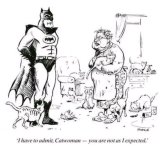So yes, Catholic theology begins with Apostolicity, but it doesn't "reshape Scripture" to fit. Scripture comes out of Apostolicity. It doesn't because it can't, conflict with Apostolicity, they go together, coming out of the same source: the Apostles.
How many blatantly obvious counter examples are there?!!!
Purgatory is place or state of purification after death before heaven.
Scripture reshaped:
Luke 23:43 [Jesus speaking to the thief on the cross], “Today you will be with Me in Paradise."
II Corinthians 5:8 To be absent from the body and to be present with the Lord.
The Catholic Church teaches that priests must remain celibate, claiming this is in keeping with apostolic tradition.
Scripture reshaped:
Matthew 8:14 Now when Jesus had come into Peter’s house, He saw his wife’s mother lying sick with a fever.
I Corinthians 9:5 Do we have no right to take along a believing wife, as do also the other apostles, the brothers of the Lord, and Cephas?
The Catholics Church teaches that believers can and should pray to saints to intercede.
Scripture reshaped:
I Timothy 2:5 For there is one God and ONE Mediator between God and men, the Man Christ Jesus.
Isaiah 8:19 Should not a people seek their God? Should they seek the dead on behalf of the living?
I could go on and on and on. Papal infallibility, transubstantiation and practically every doctrine that touches Mary, including...
- The immaculate conception of Mary
- The assumption of Mary, and...
- The title “Queen of Heaven” for Mary
All of which are directly and undeniably contrary to the clear teaching of scripture.
Then there's calling priests "Father", the use of graven images in worship, salvation through sacraments and on and on the list goes.
If I thought anyone would read it, I'd have listed these all one by one and quoted the scriptures that they violate, but almost no one would have read it and Idolater clearly has no regard for what the Bible says when it comes to persuading his mind about doctrinal matters and so it wouldn't have moved him an inch even if he had read it.
These doctrines, (I mention eleven above, but I have identified twenty seven in total - there's probably more), are not merely unbiblical, they are heretical. Taken together, they amount to a belief system that stands outside the bounds of true biblical Christianity. Catholicism is, in fact, a false religion, built on a false gospel, with no more power to save than Hinduism or the worship of Zeus and Apollo. In many ways, it is worse, because it cloaks itself in biblical language, disguising false religion with the appearance of truth.
For those of you who are interested, here my list of twenty seven Catholic doctrines or practices that reshape, contradict, or go beyond the clear teaching of Scripture along with the passages that they "reshape" (i.e. contradict, completely ignore or grossly misapply)...
- Original Sin as Inherited Guilt: Ezekiel 18:20, Romans 5:12 (misapplied)
- Baptismal Regeneration (especially of infants): Acts 2:38, Acts 8:36–37
- The Immaculate Conception of Mary: Luke 1:47, Romans 3:23
- The Assumption of Mary: No scriptural basis whatsoever
- Mary as the “Queen of Heaven”: Jeremiah 7:18
- Veneration of Mary as Mediatrix and Co‑Redemptrix: I Timothy 2:5, John 14:6
- Prayers to Saints and Mary: I Timothy 2:5, Isaiah 8:19
- The Treasury of Merit: Ephesians 1:7, Philippians 3:9
- Indulgences: Hebrews 9:28, Romans 5:1
- Purgatory: Luke 23:43, II Corinthians 5:8
- The Rosary and Repetitive Prayer: Matthew 6:7
- Use of Graven Images in Worship: Exodus 20:4–5
- Confession to a Priest: I John 1:9, Hebrews 4:16
- Extreme Unction (Last Rites): James 5:14–15 (misapplied)
- Mandatory Priestly Celibacy: Matthew 8:14, I Corinthians 9:5
- Holy Orders Conferring Ontological Change: I Peter 2:9, Hebrews 10:19–22
- Calling Priests “Father”: Matthew 23:9
- Papal Infallibility: Galatians 2:11, Acts 10:26
- Papal Primacy and Universal Jurisdiction: I Peter 5:1–3, Mark 10:42–45
- Tradition Equal to or Above Scripture: Matthew 15:3, 6, Mark 7:13
- Seven Sacraments as Channels of Grace: Ephesians 2:8–9, Romans 11:6
- Salvation Through the Sacraments: Titus 3:5, Romans 5:1
- The Mass as a Re‑sacrifice of Christ: Hebrews 9:25–28, Hebrews 10:10
- Transubstantiation: John 6:63, Hebrews 10:12, 14
- Canonization of Saints: I Corinthians 1:2, Romans 1:7
- Supersessionism (Church replaces Israel): Romans 11:1–2, Romans 11:25–29
- Feasts and Holy Days not Found in Scripture: Galatians 4:9–11, Colossians 2:16–17

